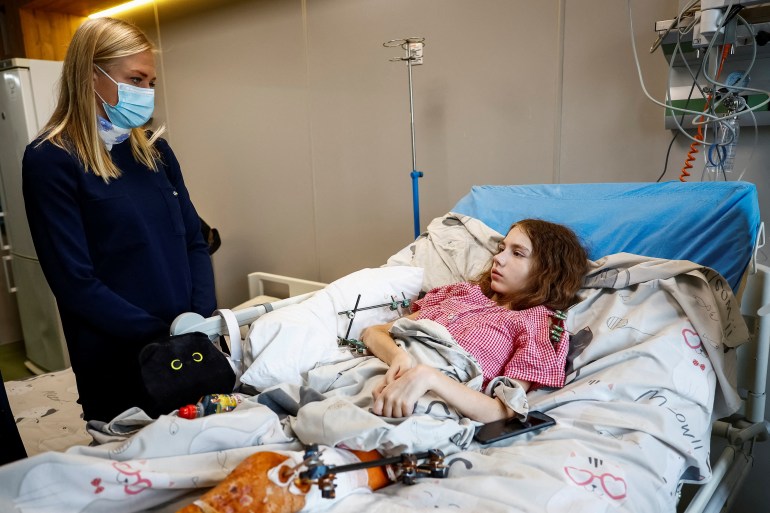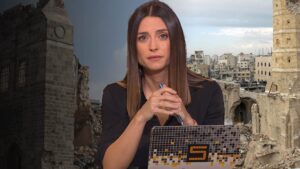Ukrainian forces launched a new surprise offensive inside Russia, expanding their salient in Kursk towards the north and east, as Kyiv’s counterinvasion passed its five-month mark this week.
Geolocated footage showed Ukrainian forces moving from their base in Sudzha towards Berdin, capturing fields and entering the settlement on Sunday.
By Monday, Ukrainian forces had also captured the settlements of Russkoye Porechnoye and Novosotnitsky. All three settlements lie on the main road between Sudzha and the regional capital, Kursk.
Russian military bloggers said Ukrainian forces also held the settlements of Martynovka, Cherkasskoye Porechnoye and Mikhaylovka.
Ukrainian forces were reported to have advanced in three waves using company-sized assaults backed by armoured vehicles, the Russian bloggers said.

One of the reasons for their success appeared to be the effective use of electronic warfare.
Advertisement
“Our drones can’t do anything about it yet, as enemy EW (electronic warfare) has nailed them literally to the ground,” one reporter wrote.
Ukrainian forces also seem to have used High Mobility Army Rocket Systems (HIMARS) to block Russian reinforcements.
“As in August, the enemy is actively covering up his offensive actions with HIMARS strikes,” wrote a Russian reporter. “He is trying to knock out our suitable reserves, artillery and drone operators.”

Explosions were reported at an aviation technical base in Kursk itself, about 70km (40 miles) from Ukrainian-held areas. The Kursk military operations headquarters claimed to have shot down more than one Ukrainian missile, suggesting others got through.
“Reports that Ukrainian forces are using long-range fires to interdict Russian rear areas and EW to degrade Russian drones in support of Ukrainian mechanised advances indicate that Ukrainian forces operating in Kursk are employing more effective combined arms tactics,” wrote the Institute for the Study of War, a Washington-based think tank.
In addition to missiles, Ukraine has used long-range drones of its own build to attack Russian energy assets. A Ukrainian drone hit a terminal for gas condensate transshipment in the port of Ust-Luga, near Leningrad, on Saturday, causing a massive fire.
Ukrainian officials have listed a number of reasons for the counterinvasion, chief among them the occupation of tens of thousands of Russian servicemen who would otherwise be attacking Ukrainian soil.
Advertisement
“The Russians have deployed their strong units to the Kursk region. Soldiers from North Korea are involved there. What’s important is that the occupier cannot currently redirect all this force to other directions, in particular the Donetsk, Sumy, Kharkiv or Zaporizhia regions,” Ukrainian President Volodymyr Zelenskyy said in an evening address on Monday.
“Since the beginning of the Kursk operation, the enemy has already lost over 38,000 troops in this area alone, including approximately 15,000 irrecoverable losses,” he said.

The General Staff of the Ukrainian Armed Forces published a list of Russian equipment destroyed in Kursk, including 104 tanks, 575 armoured combat vehicles, more than 1,000 other vehicles and 330 artillery systems.
Ukraine also said it captured 860 Russians in Kursk, using them to exchange for its own POWs.
Are the Russians running out of tanks?
Russia has been able to replace soldiers, but its ability to replace equipment is less certain.
Ukraine’s defence ministry estimated that during 2024 its forces had destroyed 3,689 Russian tanks, 8,956 armoured combat vehicles, and more than 13,000 artillery pieces. The Ukrainian Navy said it sank five ships and 458 smaller craft.
Russia has been pulling Soviet armour out of storage and refurbishing it for combat. How long it can continue to do so is unclear.
One monitor of Russian hardware estimated Russia had about 48 percent of its tanks left, and a similar percentage of its armoured fighting vehicles, but satellite photography suggested a high proportion of them were in such poor condition as to be unusable.

The London-based International Institute for Strategic Studies estimated a year ago that Russia had two to three years worth of armour left.
Advertisement
Continued Russian assaults on Ukrainian positions during the past week also raised questions about Russian armour.
Russian forces have focused much of their manpower and firepower on the twin settlements of Pokrovsk and Myrnohrad in Donetsk, and on Friday they attacked 26 times along a front 45km (30 miles) from the south.
“Fierce battles continue along the entire front line, with the hottest spot being near Pokrovsk,” Zelenskyy said in his Saturday evening address.
On Tuesday, 41 combat clashes were in this area, out of 176 across the entire front.

At the closest point, Russian forces held positions just 1.5km (1 mile) from Pokrovsk, where 7,300 civilians were reportedly still living and working.
“The intensity of the fighting has changed, it has become greater. Now, opposite us, there is a separate motorised rifle brigade and a motorised rifle regiment of the Russian Federation,” Serhiy Okishev, sergeant to the 25th Separate Airborne Brigade fighting in the Pokrovsk region told a telethon.
However, he pointed out that Russian troops were using fewer armoured vehicles and more buggies, golf carts and civilian vehicles. It was unclear if this was due to a dearth of armour in the Russian arsenal or for manoeuvrability.
A spokesman for Ukrainian forces in Kurakhove similarly said on Friday that “the Russians have switched to attacks exclusively by infantry in the past few weeks, and if armoured vehicles are used, then only for fire support and in the assaults themselves do not take part.”
Advertisement
“The Russians keep their own armoured vehicles as far as possible because they are very afraid of our antitank missile systems,” he said.
Ukraine invests in long-range and unmanned systems
Ukraine has invested heavily in its own defence industry during the past year, particularly in unmanned systems of various kinds, where it is developing innovative tactics.
Ukraine’s military intelligence on Monday told Ukrainian news outlet TSN that its Magura V sea drone shot down not one but two Russian Mi8 helicopters over the Black Sea on December 31.
The attack took place near Cape Tarkhankut, 15km (10 miles) from Sevastopol.
Unit 13 of military intelligence, responsible for operating the Magura surface drone, laid a trap for Russian aviation, which is engaged to spot and destroy naval drones once they’re sighted. “In this particular operation, we did not have the task, as usual, of hiding from aviation. We went specifically to hunt for air targets,” said an unidentified source.
Commander-in-chief Oleksandr Syrskii said the armed forces were “increasing the number of brigades with a reinforced unmanned component” and creating a separate brigade for unmanned systems.
“Overall, in December, operators of the Defense Forces of Ukraine hit over 54 thousand enemy targets. Almost half of this result – 49 percent – provided by kamikaze drones,” he wrote on social media.

Ukrainian Prime Minister Denys Shmyal on Friday announced that Ukraine planned to build about 3,000 cruise missiles and drone missiles this year, and at least 30,000 long-range drones.
Advertisement
“As part of the ‘Weapons of Victory’ project, we will launch long-term contracts with manufacturers for 3-5 years. We will pay special attention to the long-range component and missile program,” Shmyal said.
The drone and missile programmes were part of a plan to increase Ukraine’s defence industrial capacity to about $30bn, from an estimated $7bn in 2024.
United States President-elect Donald Trump has promised to end the war this year, raising the prospect of freezing the conflict along current battle lines.
Asked if he was prepared to host a multinational force of European peacekeepers in Ukraine, Zelenskyy praised France for raising the prospect but clarified that this should be part of a deal bringing Ukraine into NATO.
“It should definitely be on the path to NATO. This does not mean that the deployment of European forces excludes a future in NATO,” Zelenskyy said. “I saw that Trump is positive about this idea.”












More Stories
Meta’s move to end fact-checking reflects turn toward freewheeling internet
‘Much more persecution’: Venezuela braces for Nicolas Maduro’s inauguration
Vanishing Voices: The Fight for Cultural Preservation